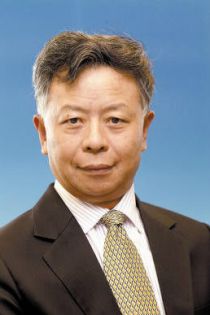Jin Liqun
Jin Liqun (金立群), former vice finance minister of China, is secretary general of the multilateral interim secretariat for establishing the Asian Infrastructure Investment Bank (AIIB). He spent a few months shuttling between countries to convince them to join the bank. On July 6, 2015, Jin was nominated as China’s candidate for president of the AIIB. On August 24, 2015, Jin was named as the official candidate for the bank's president at the 6th Chief Negotiators' Meeting on establishing the AIIB.
Born in August 1949 in Changsu, Jiangsu Province, Jin studied in Nanjing High School of Jiangyin from 1965 to 1968. In the senior high school, Jin indulged in the third edition of Webster's New World Dictionary, a rare tome in schools at that time, and read publications released by the imprint Zephyr Books.
The Cultural Revolution disrupted education and many young people in the city went to the countryside for "reeducation". Many attempted to continue with their academic pursuits while working the land, but only a few persisted.
Jin was one of them. He lived and worked in Changshu, Jiangsu Province, from 1968 to 1978, and his closest friends during that period were some of the works of Shakespeare given to him by his high school teacher.
After 10 years of a hard life in the countryside, Jin became one of the few high school graduates to bypass undergraduate studies, and was enrolled directly on to a postgraduate program majoring in British and American literature at Beijing Foreign Studies University (BFSU) in 1978.
After graduating from BFSU, Jin worked for the Ministry of Finance before reading economics at George Washington University and Boston University.
The scholar official has published several books. He led the translation work of "The House of Morgan" and wrote "Economic Development: Theories and Practices" in collaboration with Nicholas Stern, then chief economist of the European Bank.
Jin has been close to the opening up of China's financial affairs. He was once appointed deputy director general of the external finance department at the Ministry of Finance (MOF); the alternative executive director for China at the World Bank; director general of the World Bank department of MOF; and assistant minister progressing to vice minister of MOF.
As one of the first government officials to be involved in international financial affairs since the reform and opening-up of China in 1978, Jin Liqun has actively participated in multilateral cooperation on the global stage.
Jin was responsible for the release of Chinese sovereign bonds, which cost 1 billion U.S. dollars (about 6.2 billion yuan), in 1998. It showcased his persuasive ability, as it was the first sovereign bond issuance in Asia that relied on its own credibility following the Asian financial crisis in 1997.
The MOF vice minister stood out and became the first Chinese vice president of the Asian Development Bank (ADB) in August 2003. He was in charge of the South Asian and Mekong Delta Sector, and granting loans to private departments.
Greater Mekong Subregion (GMS) Economic Cooperation saw great progress during his term of office. He believed that subregional cooperation was an integral part of regional and international cooperation. Building up tighter subregional ties would be a determining factor for more comprehensive international cooperation due to globalization.
He became chairman of the board of supervisors of China Investment Corp. afterward, working with Lou Jiwei, the current MOF Minister. The two played a significant role in running the Sovereign Wealth Fund of the world's second largest economy with the largest foreign exchange reserve.
He then became chairman of China International Capital Corp. Ltd. (CICC) in 2013, entering investment banking and securities.
President Xi Jinping proposed the Asian Infrastructure Investment Bank (AIIB) during his visit in Southeast Asia in October 2013. One year later, financial ministers and representatives of the 21 prospective founding members signed the Memorandum of Understanding (MoU) on Establishing the AIIB. China, India, Singapore, Qatar and Thailand were among them.
In the meantime, Jin started working for AIIB as its the interim secretariat secretary-general. Just two days before the signing of MOU, it was confirmed that he had left CICC.
The AIIB aims to finance infrastructure in Asia. This is one of Jin's areas of expertise. During his five years at ADB, his worked to alleviate poverty through economic and social development. He helped boost infrastructure building in South Asia and the Mekong Delta area during his term of office.
